牛津译林高一英语语法大复习
- 格式:doc
- 大小:41.50 KB
- 文档页数:8
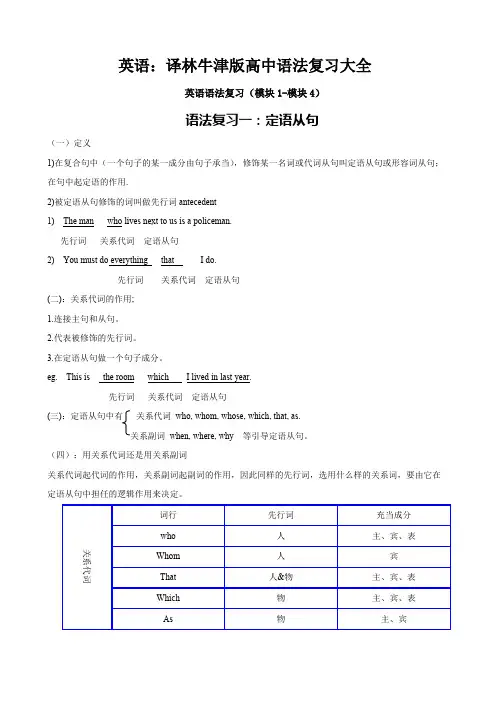
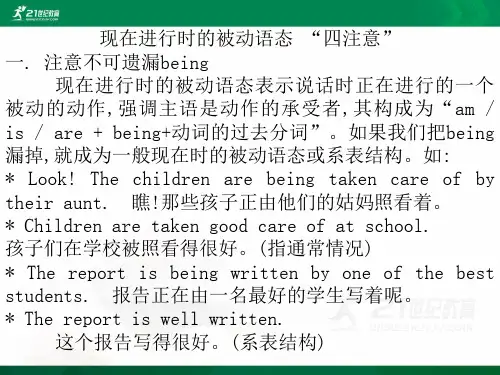
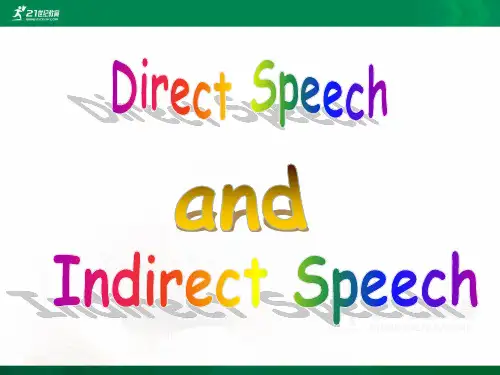
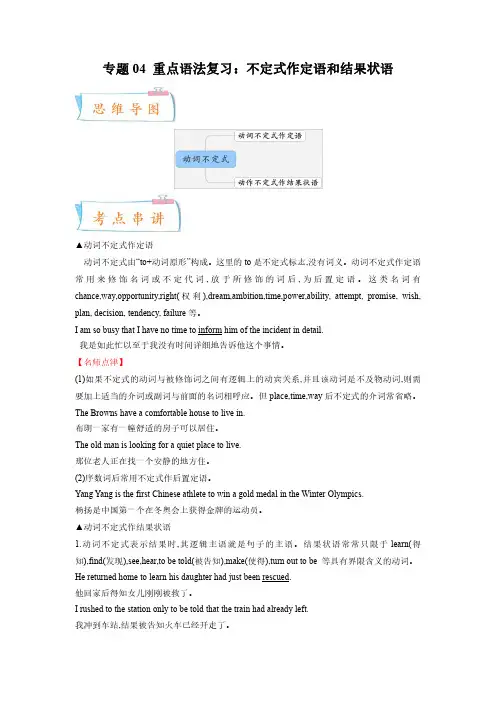
专题04重点语法复习:不定式作定语和结果状语▲动词不定式作定语动词不定式由“to+动词原形”构成。
这里的to是不定式标志,没有词义。
动词不定式作定语常用来修饰名词或不定代词,放于所修饰的词后,为后置定语。
这类名词有chance,way,opportunity,right(权利),dream,ambition,time,power,ability,attempt,promise,wish, plan,decision,tendency,failure等。
I am so busy that I have no time to inform him of the incident in detail.我是如此忙以至于我没有时间详细地告诉他这个事情。
【名师点津】(1)如果不定式的动词与被修饰词之间有逻辑上的动宾关系,并且该动词是不及物动词,则需要加上适当的介词或副词与前面的名词相呼应。
但place,time,way后不定式的介词常省略。
The Browns have a comfortable house to live in.布朗一家有一幢舒适的房子可以居住。
The old man is looking for a quiet place to live.那位老人正在找一个安静的地方住。
(2)序数词后常用不定式作后置定语。
Yang Yang is the first Chinese athlete to win a gold medal in the Winter Olympics.杨扬是中国第一个在冬奥会上获得金牌的运动员。
▲动词不定式作结果状语1.动词不定式表示结果时,其逻辑主语就是句子的主语。
结果状语常常只限于learn(得知),find(发现),see,hear,to be told(被告知),make(使得),turn out to be等具有界限含义的动词。
He returned home to learn his daughter had just been rescued.他回家后得知女儿刚刚被救了。
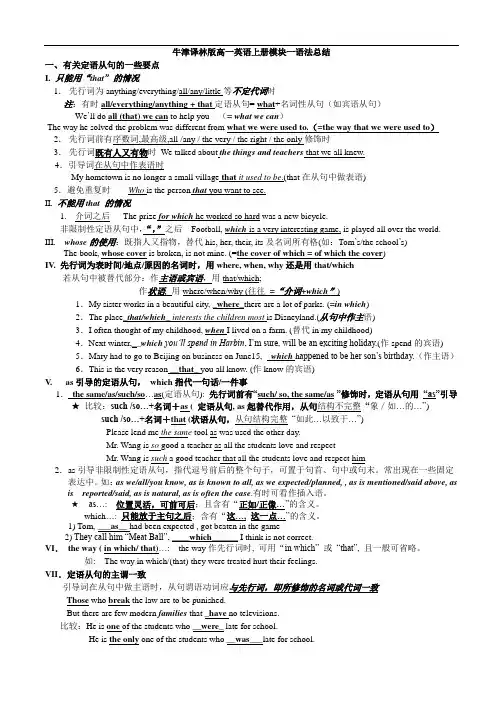
牛津译林版高一英语上册模块一语法总结一、有关定语从句的一些要点I. 只能用“that”的情况1.先行词为anything/everything/all/any/little等不定代词时注:有时all/everything/anything + that定语从句= what+名词性从句(如宾语从句)We’ll do all (that) we can to help you (= what we can)The way he solved the problem was different from what we were used to.(=the way that we were used to)2.先行词前有序数词,最高级,all /any / the very / the right / the only修饰时3.先行词既有人又有物时We talked about the things and teachers that we all knew.4.引导词在从句中作表语时My hometown is no longer a small village that it used to be.(that在从句中做表语)5.避免重复时Who is the person that you want to see.II. 不能用that 的情况1.介词之后The prize for which he worked so hard was a new bicycle.非限制性定语从句中,“,”之后Football,which is a very interesting game, is played all over the world. III. whose的使用:既指人又指物,替代his, her, their, its及名词所有格(如:Tom’s/the school’s) The book, whose cover is broken, is not mine. (=the cover of which = of which the cover)IV. 先行词为表时间/地点/原因的名词时,用where, when, why还是用that/which若从句中被替代部分:作主语或宾语,用that/which;作状语, 用where/when/why (往往=“介词+which”)1.My sister works in a beautiful city, _where_there are a lot of parks. (=in which)2.The place_that/which_ interests the children most is Disneyland.(从句中作主语)3.I often thought of my childhood, when I lived on a farm. (替代in my childhood)4.Next winter,__which you’ll spend in Harbin, I’m sure, will be an exciting holiday.(作spend的宾语)5.Mary had to go to Beijing on business on June15, which h appened to be her son’s birthday.(作主语)6.This is the very reason __that_ you all know. (作know的宾语)V. as引导的定语从句,which指代一句话/一件事1.the same/as/such/so…as(定语从句):先行词前有“such/ so, the same/as ”修饰时,定语从句用“as”引导★比较:such /so…+名词+as ( 定语从句, as起替代作用,从句结构不完整“象/如…的…”) such /so…+名词+that (状语从句,从句结构完整“如此…以致于…”)Please lend me the same tool as was used the other day.Mr. Wang is so good a teacher as all the students love and respectMr. Wang is such a good teacher that all the students love and respect him 2.as引导非限制性定语从句,指代逗号前后的整个句子,可置于句首、句中或句末。
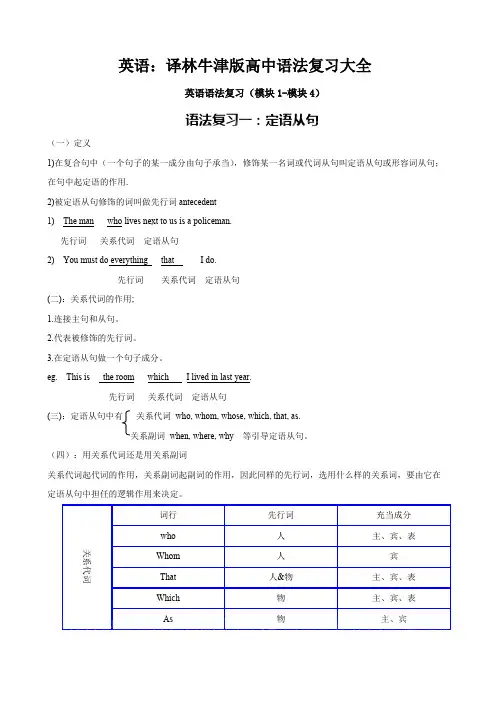
英语:译林牛津版高中语法复习大全英语语法复习(模块1-模块4)语法复习一:定语从句(一)定义1)在复合句中(一个句子的某一成分由句子承当),修饰某一名词或代词从句叫定语从句或形容词从句;在句中起定语的作用.2)被定语从句修饰的词叫做先行词antecedent1) The man who lives next to us is a policeman.先行词关系代词定语从句2) You must do everything that I do.先行词关系代词定语从句(二):关系代词的作用;1.连接主句和从句。
2.代表被修饰的先行词。
3.在定语从句做一个句子成分。
eg. This is the room which I lived in last year.先行词关系代词定语从句(三):定语从句中有关系代词who, whom, whose, which, that, as.关系副词when, where, why 等引导定语从句。
(四):用关系代词还是用关系副词关系代词起代词的作用,关系副词起副词的作用,因此同样的先行词,选用什么样的关系词,要由它在定语从句中担任的逻辑作用来决定。
词行先行词充当成分who人主、宾、表关系代词Whom人宾That人&物主、宾、表Which物主、宾、表As物主、宾Whose=of whom\of which人&物定语When=at\in\on\during which时间状Where=at\in\to which地点状关系副词Why=for which原因状that 在口语中可以代替关以上三者状系副词This is the place where we work.(vi.)(关系词所做的成分关键是有从句中的动词来决定的) This is the place which we visited. (vt. )注:先行词是time, minute, moment, next time很少用关系副词when,可用that 但通常省去。
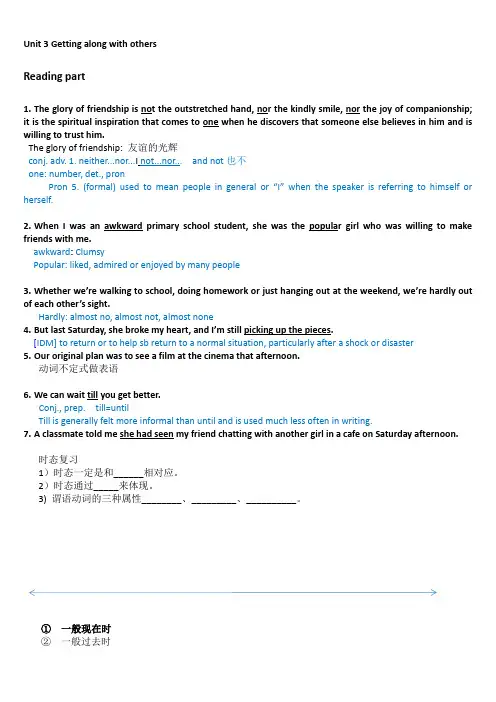
Unit 3 Getting along with othersReading part1.The glory of friendship is not the outstretched hand, nor the kindly smile, nor the joy of companionship; it is the spiritual inspiration that comes to one when he discovers that someone else believes in him and is willing to trust him.The glory of friendship: 友谊的光辉conj. adv. 1. neither...nor...I not...nor... and not也不one: number, det., pronPron 5. (formal) used to mean people in general or “I” when the speaker is referring to himself or herself.2.When I was an awkward primary school student, she was the popular girl who was willing to make friends with me.awkward: ClumsyPopular: liked, admired or enjoyed by many people3.Whether we’re walking to school, doing homework or just hanging out at the weekend, we’re hardly out of each other’s sight.Hardly: almost no, almost not, almost none4.But last Saturday, she broke my heart, and I’m still picking up the pieces.[IDM] to return or to help sb return to a normal situation, particularly after a shock or disaster5.Our original plan was to see a film at the cinema that afternoon.动词不定式做表语6.We can wait till you get better.Conj., prep. till=untilTill is generally felt more informal than until and is used much less often in writing.7.A classmate told me she had seen my friend chatting with another girl in a cafe on Saturday afternoon.时态复习1)时态一定是和______相对应。
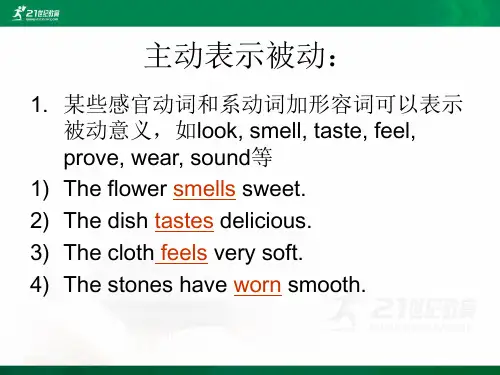
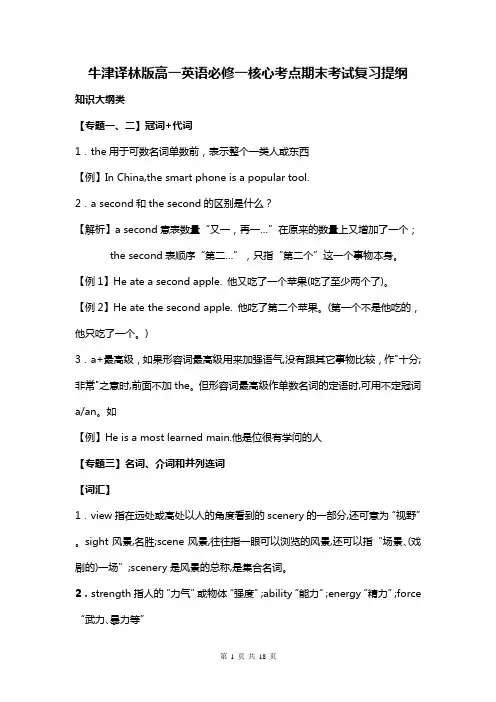
牛津译林版高一英语必修一核心考点期末考试复习提纲知识大纲类【专题一、二】冠词+代词1.the用于可数名词单数前,表示整个一类人或东西【例】In China,the smart phone is a popular tool.2.a second和the second的区别是什么?【解析】a second意表数量“又一,再一…”在原来的数量上又增加了一个;the second表顺序“第二…”,只指“第二个”这一个事物本身。
【例1】He ate a second apple. 他又吃了一个苹果(吃了至少两个了)。
【例2】He ate the second apple. 他吃了第二个苹果。
(第一个不是他吃的,他只吃了一个。
)3.a+最高级,如果形容词最高级用来加强语气,没有跟其它事物比较,作"十分;非常"之意时,前面不加the。
但形容词最高级作单数名词的定语时,可用不定冠词a/an。
如【例】He is a most learned main.他是位很有学问的人【专题三】名词、介词和并列连词【词汇】1.view指在远处或高处以人的角度看到的scenery的一部分,还可意为“视野”。sight风景,名胜;scene风景,往往指一眼可以浏览的风景,还可以指“场景、(戏剧的)一场”;scenery是风景的总称,是集合名词。2.strength指人的“力气”或物体“强度”;ability“能力”;energy“精力”;force “武力、暴力等”3.atmosphere气氛;state状态;situation处境;phenomenon现象4.against 反对,违反;靠;倚;防备【短语】1.ahead of schedule/ahead of time/in advice“提前”;on schedule按时2.anyhow 总之;无论如何;不管怎样;somehow不知怎么地;莫名其妙地3.at the height of my career“在我事业的高峰期”4.be at one's best 处于最佳状态5.be for支持, 赞成;be against反对;不同意6.be home to=be the home of是……的所在地7.be a mess/ be in a mess意为“很凌乱,一团糟”8.be similar to sb. in sth. 和某人在某方面相似9.by means of通过……手段;by no means 绝不;by all means一定,务必10.by nature天生地;by chance=by accident偶然,意外地;by far至今11.due to sb. / sth.意为“由某人/某事引起的”;be due to 应该12.equal to和……相等,等于……;similar to和……相似;13.in control of控制……;in the control of在……的控制之中。14.in exchange交换;in brief总之;in cash用现金支付15.in return 作为报答;in turn 轮流,依次,反过来;in particular尤其,特别16.in terms of谈及,就……而言,在……方面; in place of代替; 17.inform sb…of…告知某人…;warn sb. of…警告某人…;accuse sb.…of…指控某人…18.more…than…“与其说…倒不如说…”【专题四】形容词和副词形容词考查在单项填空题中一般涉及两类题型:(1)单纯的形容词在某个语段中的意义用法,所涉及的四个形容词从语意方面具有随机性,相互之间没有任何相近或相似之处,只考查哪个词适合所在的语言片段,大部分测试题采用类似的测试路线,旨在了解学生的词汇量水平。
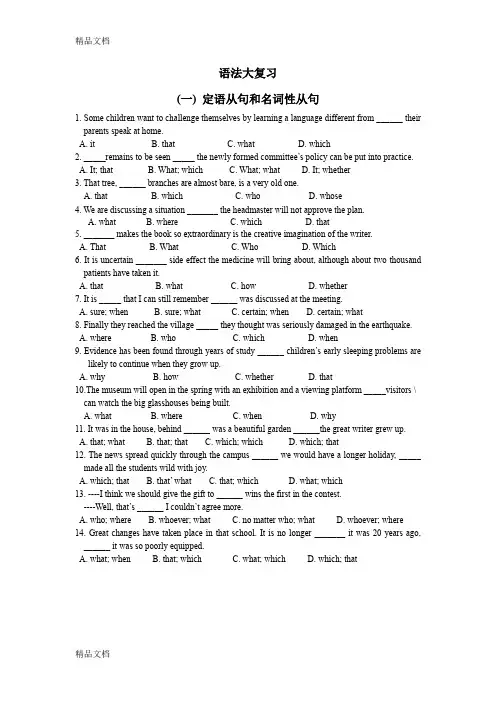
语法大复习(一) 定语从句和名词性从句1. Some children want to challenge themselves by learning a language different from ______ their parents speak at home.A. itB. thatC. whatD. which2. _____remains to be seen _____ the newly formed c ommittee’s policy can be put into practice.A. It; thatB. What; whichC. What; whatD. It; whether3. That tree, ______ branches are almost bare, is a very old one.A. thatB. whichC. whoD. whose4. We are discussing a situation _______ the headmaster will not approve the plan.A. whatB. whereC. whichD. that5. _______ makes the book so extraordinary is the creative imagination of the writer.A. ThatB. WhatC. WhoD. Which6. It is uncertain _______ side effect the medicine will bring about, although about two thousand patients have taken it.A. thatB. whatC. howD. whether7. It is _____ that I can still remember ______ was discussed at the meeting.A. sure; whenB. sure; whatC. certain; whenD. certain; what8. Finally they reached the village _____ they thought was seriously damaged in the earthquake.A. whereB. whoC. whichD. when9. Evidence has been found through years of study ______ children’s early sleeping problems arelikely to continue when they grow up.A. whyB. howC. whetherD. that10.The museum will open in the spring with an exhibition and a viewing platform _____visitors \ can watch the big glasshouses being built.A. whatB. whereC. whenD. why11. It was in the house, behind ______ was a beautiful garden ______the great writer grew up.A. that; whatB. that; thatC. which; whichD. which; that12. The news spread quickly through the campus ______ we would have a longer holiday, _____ made all the students wild with joy.A. which; thatB. that’ whatC. that; whichD. what; which13. ----I think we should give the gift to ______ wins the first in the contest.----Well, that’s ______ I couldn’t agree more.A. who; whereB. whoever; whatC. no matter who; whatD. whoever; where14. Great changes have taken place in that school. It is no longer _______ it was 20 years ago, ______ it was so poorly equipped.A. what; whenB. that; whichC. what; whichD. which; that(二)时态1. have done vs. have been doing强调现在已经完成强调从过去到现在一直在做(现在还在进行)2. have done vs. did1.It is the 序数词time that have done2.It/This is the 最高级+n. that have done3. had done 过去的过去(句中有did, 在did之前发生的动作用had done)序数词time that had done4. would do/was to do sth 过去将来was going to do sth but 本打算做某事,但是was about to do sth when 当……正准备做某事5. will be doing 将正在做某事明显的时间状语1. at 8.am tomorrow(将来时间)2. at that time3. then6. +过去时间或动作had doneBy +now have done+将来时间或动作will have done1. I won’t be able to watch the concert on TV because I ________homework at that time.A. will have doneB. will be doingC. will doD. will have doing2. In a room above the store, where a party ______, some workers were busily setting the table.A. was to be heldB. has been heldC. will be heldD. is being held3. The students _______ several new English songs by the end of last term.A. had learnedB. learnedC. have learnedD. will have learned4. --- Did he notice you enter the room?--- I don’t think so. He ______ to the radio with his eyes shut.A. listenedB. was listeningC. has listenedD. had listened5. ----What _____these days? Still busy writing your new book?----Yes, I think I can finish it next week.A. do you doB. have you been doingC. have you doneD. did you do6. ----Where ______my pen? I cann’t find it anywhere.----I ______it on this table, but now it’s gone.A. did you put; have putB. have you put; putC. had you put; was puttingD. were you putting; have put7. –--Will you be free at three o’clock tomorrow afternoon.----No, I ________ a meeting at that time.A. will haveB. was going to haveC. will be havingD. would have8. ---–Why did you buy this paint so early?-----I _______ my bedroom tomorrow, but I changed my mind.A. was going to paintB. am going to paintC. am paintingD. will paint9.——Jack has returned from America.—— Really? I______ him when you came in.A. will callB. would callC. was going to callD. was about to call10. He thought he ________ able to lock the door before the animal reached it.A. will beB. can beC. would beD. had been11. ----I’m sorry, but I don’t quite follow you. Did you say you wanted to return on September 20?----Sorry, I ______ myself clear. We want to return on October 20.A. hadn’t madeB. wouldn’t makeC. don’t makeD. haven’t make12. By next summer John_______ in this factory for thirteen years.A. has been workingB. will have been workingC. will be workingD. has worked13. Now that she is out of job, Lucy ___ going back to school,but she hasn’t decided yet.A. had consideredB. has been consideringC. consideredD. is going to consider14. ____ in London for many years,but I’ve never regretted my final decision to move back to China.A. livedB. was livingC. have livedD. had lived(三)反义疑问句1. I don’t suppose Tom has told you the news, _________?A. do IB. don’t IC. does heD. has he2. ----It’s useless crying over spoiled milk, ________?----It’s better later than never. Actually, no one has expected it, __________?A. is it; have theyB. isn’t it; hasn’t heC. isn’t it; have theyD. is it; hasn’t he3. Everyone in the class seems to have passed the term test, _________?A. hasn’t heB. haven’t theyC. don’t theyD. doesn’t it4. She seldom thinks what her father says is right, ________?A. does sheB. is itC. doesn’t sheD. isn’t it5. Let’s watch the TV play that my s ister mentioned this morning, _________?A. shall weB. will youC. don’t weD. aren’t we(四)主谓一致1. ----When and where they will hold the press conference _________ yet.----What a pity!A. hasn’t decidedB. hasn’t been decidedC. haven’t decidedD. haven’t been decided2. Three fifths of the police ________ in the school near the town.A. has trainedB. have trainedC. has been trainedD. have been trained3. ----Why does the lake smell terrible?----Because large quantities of the water ________.A. have pollutedB. is being pollutedC. has been pollutedD. have been polluted4. The teacher as well as the students who _______ fond of football, ______ playing together.A. are; isB. are; areC. is; areD. is; is5. I have finished a large part of novel written by Dickens, the rest of which ______ very difficult.A. isB. areC. wasD. were6. Barbara is easy to recog nize as she’s the only one of the women who _______ evening dress.A. wearB. wearsC. has wornD. have worn(五)情态动词1. It is hard to say what kind of person he is. Sometimes he is very friendly; at other times he_____ be very cold.A. canB. mustC. willD. shall2. Tom’s father promised, “You ______have a new computer if you pass the coming examination,”A. canB. shouldC. shallD. may3. According to the rules and regulations, all payments _____ be made in cash in the shoppingcenter.A. shallB. canC. mustD. should4. When he was there, he ______ go to that coffee shop at the corner after work every day.A. wouldB. shouldC. mightD. had better5. ---- It _______ be Mary in the office.---- I’m sure it _______ be her. I saw her off at the bus station just ten minutes ago.A. must; shouldn’tB. should; can’tC. must; can’tD. can; mustn’t(六)直接引语和间接引语1. Michelle said to me, “ Don’t believe every advertisement you read.”Michelle _______ me _______ ________ believe every advertisement I read.2. The candidate said to the manager, “ Please give me five minutes for preparation.”The candidate ________ the manager________ ________ him five minutes for preparation.答案:(一)1-5:CDDBB 6-10: BDCDB 11-14: DCDA(二)1-5: BAABB 6-10: BCADC 11-14: DBBA(三)DCCAA(四)BDDAAB(五)ACAAC(六)1. told/asked/advised not to2. asked to give。
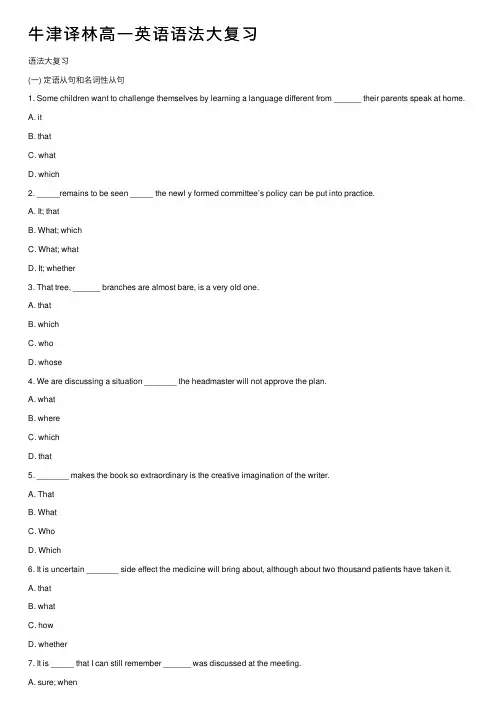
⽜津译林⾼⼀英语语法⼤复习语法⼤复习(⼀) 定语从句和名词性从句1. Some children want to challenge themselves by learning a language different from ______ their parents speak at home.A. itB. thatC. whatD. which2. _____remains to be seen _____ the newl y formed committee’s policy can be put into practice.A. It; thatB. What; whichC. What; whatD. It; whether3. That tree, ______ branches are almost bare, is a very old one.A. thatB. whichC. whoD. whose4. We are discussing a situation _______ the headmaster will not approve the plan.A. whatB. whereC. whichD. that5. _______ makes the book so extraordinary is the creative imagination of the writer.A. ThatB. WhatC. WhoD. Which6. It is uncertain _______ side effect the medicine will bring about, although about two thousand patients have taken it.A. thatB. whatC. howD. whether7. It is _____ that I can still remember ______ was discussed at the meeting.A. sure; whenB. sure; whatC. certain; whenD. certain; what8. Finally they reached the village _____ they thought was seriously damaged in the earthquake.A. whereB. whoC. whichD. when9. Evidence has been found through years of study ______ children’s early sleeping problems are likely to continue when they grow up.A. whyB. howC. whetherD. that10.The?museum?will?open?in?the?spring?with?an?exhibition?and?a?viewing?platform?_____v isitors?\can?watch?the?big?glasshouses?being?built.?A.?what????????? ???B.?whereC.?whenD.?why11. It was in the house, behind ______ was a beautiful garden ______the great writer grew up.A. that; whatB. that; thatC. which; whichD. which; that12. The news spread quickly through the campus ______ we would have a longer holiday, _____ made all the students wild with joy.A. which; thatB. that’ whatC. that; whichD. what; which13. ----I think we should give the gift to ______ wins the first in the contest.----Well, that’s ______ I couldn’t agree more.A. who; whereB. whoever; whatC. no matter who; whatD. whoever; where14. Great changes have taken place in that school. It is no longer _______ it was 20 years ago, ______ it was so poorly equipped.A. what; whenB. that; whichC. what; whichD. which; that(⼆)时态1. have done vs. have been doing强调现在已经完成强调从过去到现在⼀直在做(现在还在进⾏)2. have done vs. did强调对现在的影响只是陈述过去的动作,与现在⽆关1.2.It is the 序数词time that have done3.4.It/This is the 最⾼级+n. that have done3. had done 过去的过去(句中有did, 在did之前发⽣的动作⽤had done)序数词time that had done4. would do/was to do sth 过去将来was going to do sth but 本打算做某事,但是was about to do sth when 当……正准备做某事5. will be doing 将正在做某事明显的时间状语1. at 8.am tomorrow(将来时间)2. at that time3. then6. +过去时间或动作had doneBy +now have done+将来时间或动作will have done1. I won’t be able to watch the concert on TV because I ________homework at that ti me.A. will have doneB. will be doingC. will doD. will have doing2. In a room above the store, where a party ______, some workers were busily setting the table.A. was to be heldB. has been heldC. will be heldD. is being held3. The students _______ several new English songs by the end of last term.A. had learnedB.learnedC. have learnedD. will have learned4. --- Did he notice you enter the room?--- I don’t think so. He ______ to the radio with his eyes shut.A. listenedB. was listeningC. has listenedD. had listened5. ----What _____these days? Still busy writing your new book?----Yes, I think I can finish it next week.A. do you doB. have you been doingC. have you doneD. did you do6. ----Where ______my pen? I cann’t find it anywhere.----I ______it on this table, but now it’s gone.A. did you put; have putB. have you put; putC. had you put; was puttingD. were you putting; have put7. –--Will you be free at three o’clock tomorrow afternoon.----No, I ________ a meeting at that time.A. will haveB. was going to haveC. will be havingD. would have8. ---–Why did you buy this paint so early?-----I _______ my bedroom tomorrow, but I changed my mind.A. was going to paintB. am going to paintC. am paintingD. will paint9.——Jack has returned from America.—— Really? I______ him when you came in.A. will callB. would callC. was going to callD. was about to call10. He thought he ________ able to lock the door before the animal reached it.A. will beB. can beC. would beD. had been11. ----I’m sorry, but I don’t quite follow you. Did you say you wanted to return on September 20?----Sorry, I ______ myself clear. We want to return on October 20.A. hadn’t madeB. wouldn’t makeC. don’t makeD. haven’t make12. By next summer John_______ in this factory for thirteen years.A. has been workingB. will have been workingC. will be workingD. has worked13.?Now?that?she?is?out?of?job,?Lucy?___?going?back?to?school,but?she?hasn’t?decided?yet.A.?had?consideredB.?has?been?considering? ???C.?consideredD.?is?goi ng?to?consider14. ____ in London for many years,but I’ve never regretted my final decision to move back to China.A. livedB. was livingC. have livedD. had lived(三)反义疑问句1. I don’t suppose Tom has told you the news, _________?A. do IB. don’t IC. does heD. has he2. ----It’s useless crying over spoiled milk, ________?----It’s better later than never. Actually, no one has expected it, __________?A. is it; have theyB. isn’t it; hasn’t heC. isn’t it; have theyD. is it; hasn’t he3. Everyone in the class seems to have passed the term test, _________?A. hasn’t heB. haven’t theyC. don’t theyD. doesn’t it4. She seldom thinks what her father says is right, ________?A. does sheB. is itC. doesn’t sheD. isn’t it5. Let’s watch the TV play that my sister mentioned this morning, _________?A. shall weB. will youC. don’t weD. aren’t we(四)主谓⼀致1. ----When and where they will hold the press conference _________ yet.----What a pity!A. hasn’t decidedB. hasn’t been decidedC. haven’t decidedD. haven’t been decided2. Three fifths of the police ________ in the school near the town.A. has trainedB. have trainedC. has been trainedD. have been trained3. ----Why does the lake smell terrible?----Because large quantities of the water ________.A. have pollutedB. is being pollutedC. has been pollutedD. have been polluted4. The teacher as well as the students who _______ fond of football, ______ playing together.A. are; isB. are; areC. is; areD. is; is5. I have finished a large part of novel written by Dickens, the rest of which ______ very difficult.A. isB. areC. wasD. were6. Barbara is easy to recognize as she’s the only one of the women who _______ evening dress.A. wearB. wearsC. has wornD. have worn(五)情态动词1. It is hard to say what kind of person he is. Sometimes he is very friendly; at other times he_____ be very cold.A. canB. mustC. willD. shall2. Tom’s father promised, “You ______have a new computer if you pass the coming examination,”A. canB. shouldC. shallD. may3. According to the rules and regulations, all payments _____ be made in cash in the shopping center.A. shallB. canC. mustD. should4. When he was there, he ______ go to that coffee shop at the corner after work every day.A. wouldB. shouldC. mightD. had better5. ---- It _______ be Mary in the office.---- I’m sure it _______ be her. I saw her off at the bus station just ten minutes ago.A. must; shouldn’tB. should; can’tC. must; can’tD. can; mustn’t(六)直接引语和间接引语1. Michelle said to me, “ Don’t believe every advertisement you read.”Michelle _______ me _______ ________ believe every advertisement I read.2. The candidate said to the manager, “ Please give me five minutes for preparation.”The candidate ________ the manager________ ________ him five minutes for preparation. 答案:(⼀)1-5:CDDBB 6-10: BDCDB 11-14: DCDA(⼆)1-5: BAABB 6-10: BCADC 11-14: DBBA(三)DCCAA(四)BDDAAB(五)ACAAC(六)1. told/asked/advised not to2. asked to give。
(牛津译林版)高一英语期末总复习教学重难点:重点单词词组,语法知识点(一)单词词组:对指挥官的妻子好奇be curious about the commander’s wife启航去满是冰山的地方set sail for the place full of icebergs在场的候选人present candidates出席/参加重要的舞会be present at the important party科学的解释scientific explanation与……相比compared to/with把探险家与船长比较compare explorer with captain把A比作B compare A to B大量,许多 a great deal of/a large amount of/a great many/a large number of 在轨道内in orbit环绕地球运行orbit the earth胜任这项任务be qualified for the task为他赢得了这个职位win him this position作为……出名be known as肯定的是what is certain is…和as well as也会导致疾病result in illness as well通往河岸lead to the bank of the river心脏病heart trouble7年内within 7 years木乃尹的诅咒the curse of the mummy一……就upon/on doing; hardly…when; no sooner…than宁愿……would rather do than do/prefer to do rather than do鼓励我们仔细检查encourage us to examine carefully不鼓励discourage sb from doing结果as a result (of sth)设法做成manage to do清空坟墓empty the tomb预先in advance与制造商有关have something to do with the maker在地震中幸存survive the earthquake忙于……be busy doing/be busy with飞往非洲fly to Africa乘骆驼穿越沙漠travel through the desert on camels/by camel事实上in fact/as a matter of fact/actually在黑暗中in the dark万一船上下翻转过来in case the boat get turned upside down包括山谷including the valley吓跑野生动物scare away the wild animals与细菌和谐相处be in harmony with viruses根据政府正式出版的书according to the book officially published by the government形成人间天堂form a heaven on earth盼望着它带来好结果look forward to its paying off屹立在辽阔的草原上tower over the vast grassland晴朗的晚上on clear nights确定提供足够的旅游点make sure you have provided enough tourist spots食物和水的供应supplies of food and water延伸到天空reach to the sky不论长颈鹿多么普通however common the giraffe is不论背包里有什么whatever is in the backpack排除她嫉妒她妹妹的可能性rule out the possibility that she envies her sister编造谎言make up lies加紧探索外太空step up searching the outer space由于相似的网站due to a similar website负责最近发生的案件take charge of the case happened lately/recently对这个无法解释的传说感到失望be disappointed at the unexplained tale对战斗机飞行员感到失望be disappointed with the fighter pilot放弃支持他的冒险give up supporting his adventure梦想追赶太阳dream of running after the sun把目击证人从村民中分出separate witnesses from the villagers被看见研究多毛动物be seen to research hairy creature(二)语法:1. 定语从句2. 时态:现在完成时与将来进行时【模拟试题】Ⅰ. Multiple choice1. When I go to the doctor’s, I always take something to read _____ I have to wait.A. in caseB. so thatC. in order that D as if2. That was reading a wonderful evening. It’s years _____ I enjoyed myself so much.A. whenB. thatC. beforeD. since3. They had to returned from the hiking in the desert, for the food almost _____.A. ran out ofB. used upC. was run outD. ran out4. She must have gone out early, for she did not _____ for breakfast.A. show aroundB. show offC. show outD. show up5. –How do you keep_____?–I keep _____ every day.A. fit; working hardB. fit; working outC. fitting; working outD. fitting; working hard6. I’ll never forget the days _____ I spent on the farm during my childhood.A. whenB. thatC. in whichD. on which7. There is no light in the dormitory. They must have gone to the lecture,________ ?A. didn’t theyB. don’t theyC. mustn’t theyD. haven’t they8. Not only food and clothing but also medical treatment has been ______ the people who need it in the flooded areas.A. supplied withB. provided forC. set out toD. turned in9. It was the way _____ he walk _____ makes people laugh.A. which; thatB. that; whichC. which; whichD. that; that10. The ______ bodies _______ the world ______ mummies.A. preserving; are known to; asB. preserved; are known as; toC. preserving; are known as; toD. preserved; are known to; as11. I’m considering ______ a washing machine, which is considered ______ a great help to my wife.A. buying; to beB. buying; beingC. to buy; beingD. to buy; to be12. The conference has been held to discuss the effects of tourism ______ the wild life in the area.A. inB. onC. atD. with13. The bus ran into a big tree by the road, ___ ten people to get hurt.A. causingB. causedC. being causedD. having caused14. The people in the tsunami-hit areas need ___ food badly.A. a large supply ofB. a plenty ofC. a large number ofD. a great many15. The journey around the world ___ the old sailor nine months, ___ the sailing time was 226 days.A. spent; during whichB. cost; from whichC. took; of whichD. needed; for which16. –Are all the names of your class ___ here?–Yes, all ___ mine.A. listed; includedB. listing; includesC. listed; includingD. being listed; being included17. ___ difficulties I meet with on my way to success, I will overcome them.A. WhateverB. WheneverC. WhatD. However18. I bought a new type of cell-phone, which was the ___ of all my classmates.A. admireB. wishC. respectD. envy19. Excuse me for breaking in, I have some news for you.A. soB. andC. butD. yet20. He was caught the rain when he was walking in the street.A. inB. underC. withD. fromⅡ. ClozeOur neighbour’s son was getting married in 1991 at an out-town church, and my husband and I were invited. We immediately rush out to a 21 , and I bought a nice pink dress with a jacket. The dress was a 22 .tight, but I had a month to go before the June 30 wedding and I would 23 a few pounds.June 29 came and, of course, I hadn’t lost a single pound; in fact, I had 24 two. But I 25 a nice new girdle(紧身衣)would cure everything. So on the way out of the city we 26 once again at the store. I ran in and told the clerk I needed a large 27 panty girdle. The clerk found the box with the described girdle 28 “LG”, and asked if I would like to try it on. “Oh, no, a large will fit just right. I needn’t try it on”.The next morning was rather hot, one of those thirty four 29 days, I suppose, So I 30 to get dressed until about 45 minutes 31 time to go. I popped open the box only to find a new girdle in a small size. Since it was too late to find another one and the dress wouldn’t 32 right without a girdle, a fight 33 in the hotel room between me and the girdle. Have you ever tried to 34 20 pounds of potatoes into a 35 bag? That’s it. Finally my husband, 36 like crazy, got hold of each side and shook me down into it. At once I put on the pink dress, which didn’t 37 very well with my red face, and was ready to go.Finally we got it the Church. I heard one of the people say that they were having a High Mass (大弥撒). I turned 38 my husband and asked. “What is a High Mass?” He shrugged his shoulders.39 , I learned that this particular Mass would last one hour, twenty-two minutes and eight and one half seconds -the priest(神父) was going to bless everything 40 my girdle.21. A. hotel B. store C. church D. office22. A. little B. much C. few D. many23. A. put on B. gain C. lose D. miss24. A. won B. received C. gained D. accept25. A. advise B. suggested C. determine D. consider26. A. went B. arrived C. stopped D. entered27. A. size B. length C. width D. depth28. A. marking B. to mark C. mark D. marked29. A. level B. point C. degree D. degrees30. A. wanted B. expected C. tried D. waited31. A. when B. while C. before D. after32. A. work B. use C. wear D. fit33. A. broke down B. broke out C. broke up D. broke away34. A. shake B. drag C. push D. put35. A. five-pounds B. five-pound C. five-pound D. five pound’s36. A. laughing B. crying C. shouting D. smiling37. A. do B. look C. work D. go38. A. for B. at C. to D. by39. A. Luckily B. Quickly C. Immediately D. Unfortunately40. A. besides B. except C. except for D. except thatⅢ. Reading comprehensionAThe Nose on Your FaceThe human nose gives to the languages of the world many interesting expressions. Of course, this is not surprising. Without the nose, we could not breathe or smell. It is the part of the face that gives a person special character.In English there are a number of phrases about the nose. For example, to hold up one’s nose expresses a basic human feeling -pride. People can hold up their noses at people, things and places.The phrase, to be led around by the nose show man’s weakness. A person who is led around by the nose lets other people control him. On the other hand, a person who follows his nose lets his instinct (直觉、本能) guide him.For the human emotion of rejection, the phrase to have one’s nose put out of joint(接头) is very descriptive. The expression is not new. It was used by Erasmus in 1542.This is only a sampling of expressions in English dealing with the nose. There are a number of others. However, it should be as plain as the nose on your face that the nose is more than an organ (器官) for breathing and smelling!41.This passage is about .A. the human nose, an organ for breathing and smellingB. the nose giving various expressionsC. the nose is the part of the faceD. the nose that gives a person his special character42. Person who is led around by the noseA. lets his instinct guide himB. has no will of his wonC. is strong-mindedD. is full of imagination43. A man who is described as “to have one’s nose put out of joint”A. is happyB. wants to smell a flowerC. is illD. feels hurt and rejected44. When you say it is “as plain as the nose on your face” you meanA. it is easy to solveB. it is a hard nut to crackC. it is something quite easy to understandD. there is a plain-looking nose on your face45. “The nose is more than an organ for breathing and smelling” meansA. breathing and smelling are the only two uses of itB. the nose is more important than any other organC. more can be said of this human organ than its function of breathing and smellingD. other organs also have a function of breathing and smellingBAbout ten men in every hundred suffer from color blindness in some way. Women are luckier,only about one in two hundred is affected in this matter. Perhaps, after all, it is safer to be driven by a woman.There are different forms of color blindness. In some cases a man may not be able to see deep red. He may think that red, orange and yellow are all shades of green. Sometimes a person cannot tell the difference between blue and green. In rare cases an unlucky man see everything in shades of green—a strange world indeed.Color blindness in human beings is a strange thing to explain. In a single eye there are millions of very small things called “cones”. These help us to see in a bright and tell di fference between colors. There are also millions of “rods”, but these are used for seeing when it is nearly dark. They show us shape but no color. Some insects have favorite colors. Mosquitoes(蚊子) like blue but do not like yellow. A red light will not attract insects, but a blue lamp will. In a similar way human being also have favorite colors. Yet we are lucky. With the aid of the cones in our eyes we can see many beautiful colors by day, and with the aid of the rods we can see shapes at night. One day we may even learn more about the invisible colors around us.46. This passage is mainly aboutA. color and its surprising effectsB. women being luckier than menC. danger caused by color blindnessD. color blindness47. According to the passage, with the help of the “cones”, we canA. tell different coloursB. see in a weak lightC. tell different shapesD. tell orange from yellow48. Why do some people say it is safer to be driven by women?A. Women are more careful.B. There are fewer color-blind women.C. Women are fonder of driving than men.D. Women are weaker but quicker in thinking.49. Which of the statements about the color-blind is true?A. Not all of them have the same problem in recognizing colors.B. None of them can see deep red.C. None of them can tell the difference between blue and green.D. All of them see everything in shades of green.50. We can attract and kill mosquitoes by using aA. red lightB. yellow lightC. blue lightD. green lightC51. Which of the following is not mentioned as being up for bid at the auction?A. A movie pass to the local cinema.B. A weekend stay at a hotel.C. A ticket to a restaurant.D. Airline tickets.52. The more items that are given or bought for auction,A. the less money that will be charged for the tickets to the auctionB. the more money that can be raised to support the computer labC. the faster the ticket will be sold to the auctionD. the higher the value that will be placed on the items in the silent auction53. The phrase “first-come, first-served” tells you thatA. people can buy the tickets on the first day onlyB. the person who is first to arrive will receive a ticket at no chargeC. food and drinks will be served at the auctionD. tickets are sold in the order of who arrives first to buy them54. Which of the following is most likely to happ en at the year’s auction?A. The airline tickets will receive higher bids than any other item.B. All items up of bid will be sold for at least twice their value.C. More money will be raised this year than in any other year before.D. Tickets for the event will be sold out in less than one week.55. When dose the main auction begin?A. 7.00p.m.——7.30p.m.B. 6.30p.m.——7.00p.m.C.7.30p.m.——11.00p.m.D. 6.00p.m.——6.30p.m.Ⅳ. Read the following sentences and replace the underlined parts with words or phrases with same meanings.1. At home, Justin feels love and kindness are all around him. _____________2. The TV program “Tell it like it is” is so interesting that there are millions of people watching it. ____________3. When the robbers in the bank pointed guns at the customers, some people were unable to speak with fear. _____________4.Be careful of the dog; it sometimes bites people. ____ _____ _____5. He looks honest, but in fact he is telling a lie. _____________6. Have ever read about the exciting experiences of Marco Polo? ______________7. Our guides have guns with them to frighten the animals away. ___________8. In this country, you will often see very large areas of forest when driving along the road. __________9. Bring a lot of extra film if you don’t want to use it up. _____ ______ _______10. He is nearly 1.9 meters tall. He is much taller than all his classmates. ____ ____V. Translation1. 他酒后驾驶导致了这起事故,造成12人死亡。
牛津高中英语-模块一第一单元一定语从句:定语从句的介绍1.就像是一个形容词或介词短语修饰名词一样,定语从句也可以修饰名词。
定语从句所修饰的名词称为先行词。
形容词:The green team介词短语:The team in green定语从句:The team who were wearing green2.定语从句通常由关系代词来引导,如which, that, who, whom, whose,或关系副词来引导,如when, where, why。
关系代词可以在定语从句中担当主语,宾语,表语,定语;关系副词可以在定语从句中担当状语。
如:做主语The trees which are on the school campus have lost their leaves.做宾语The student whom we saw just now is the best runner in our school.做表语Jack is no longer the lazy boy that he used to be.做定语She has a brother whose name I can’t remember.做状语Theschool where he studied is in Shenzhen.二定语从句:关系代词:that,which,who,whom,和whose 1.在定语从句中,that和which用来指代物。
如:This is the story that /which we wrote for our storytelling contest.2.在定语从句中,who 用来指代人。
如:I am going to see a friend who has just come back from the UK.3.当who在定语从句中做宾语时,可以用whom来取代,且whom比who更正式。
牛津译林版高一英语高频知识点总结重点句型1.“So + be/have/助动词/情态动词+主词”的结构。
此结构中的语序是倒装的,“So”代替上句中的某个成分。
如果上面一句是否定句,则使用“Neither/Nor+be/have/助动词/情态动词+主语”的结构。
例如He’s tired,and so am I.(=I’ m also tired.)You can swim,and so can I.(=I can also swim.)She has had supper,and so can I.(=I’ve had lunch,too.)Tom speaks English,and so does his sister.(=His sister speaks English,too.)A: I went to the park yesterday.B: So did I.(=I also went to the park yesterday.)2.“So +主语+be/have/助动词/情态动词”结构中的主谓是正常语序,so相当于indeed,certainly,表示说话人对前面或对方所说情况的肯定、赞同或证实,语气较强,意思是“确实如此”。
例如A:It was cold yesterday.昨天很冷。
B:So it was.的确如此。
(=Yes,it was.) A:You seem to like sports.B:So I do.(=Yes,I do.)A:It will be fine tomorrow.B:So it will.(=Yes ,it will.)3.“主语+do/does/did + so”结构指的是按上句的要求做了。
此句型中do so代替上文中要求做的事,以免重复。
My Chinese teacher told me to hand in my composition on time and I did so.(=I handed in my composition on time.) 语文老师叫我按时交作文, 我照办了。
Senior En glish Revisi on for Grade 1(A)牛津版英语高一复习(短语)III. Phrases6.厂used to do sth.过去常常做某事_be used to do sth.被用来做某事(一般是物做主语) be used to doing sth.习惯于做某事 7. for free 例for example 常用于句首,后面有逗号与别的句子隔开如at the beginning of 在 ..... 开头; 在 . 初 at the age of 在 .... 岁时10. with satisfaction/freedom/patienee 满意/自由 /耐心in silence/distance/surprise/amazement 沉默 /遥远 /惊讶 /惊愕to one ' s surprise/ joy/regret/satisfaction/disappointment/annoyance/sorrow“to +one '情感类名词”结构在句中常用作插入语,表示说话人的态度、观 点等。
一般位于句首,并用逗号与句子的主干部分隔开,其作用相当于结果状1. be fond2. lookback( on) 3. make use of4. in charge of be in con trol of (sth.) take charge of5.earn respect such as常用于句中,后面没有逗号与别的句子隔开9.at the end of 在 ..... 末 8.使某人惊讶 /高兴/后悔/满意 / 失望/恼火/悲伤的是语,用在英语书面表达中能增强文章的感染力。
11. an enjoyable experienee —次愉快的经历a man of much experie nee —个经验丰富的人experie nee v.& cn. un. 作“经历”时,是可数名词;作“经验”时,是不可数名词12. a chanee to do sth.13. defe nd on eself14. in stead of15. gradate from 毕业于(学校)graduate in 毕业于(专业)He graduated in chemistry from Hunan University last year.step up /look up to/加强/ 钦佩15. depend on 依靠be hard on (sb.)对(某人)要求严格16. inform sb. of sth. 通知某人某事approve of sb. sth. 赞成某人某事17. can' t wait to do sth. 迫不及待做某事be dying to do sth. 渴望做某事desire to do sth.18. be supposed toin this regard 在这方面; 关于此事run out /get out of/blow out/ out / 用完;耗尽/离开 / 吹灭 / 帮忙解决/ 拿出/ 摆开/ 闲逛 /find out/hold out/leave out /set out/tur n out/come out/19. insist on 20. garbage canIntern et21. 22. 23. 24. 25. physical cha nge in a mess 一团糟shout at sb. bel ong to 属于be difficult to believe 身体变化side effectat a losstend tohave difficulty doing sth. 不知所措易于;往往 due to难以置信做某事有困难由于,因为26. in the long从长远的角度看 in no time ——soon很快in fact --- as a matter of fact 实际上27. lose weight 减月巴 put on weight 增重,增肥;发福put o n 穿上;播放; 增加 28. go on a diet 节食29. do damage to --- do harm to 有害30. make use of 利用make the most of --- make good use of --- make the best of---take full adva ntage of 充分禾U 用 31. doze ns of 许多,很多32. make one ' s way to 前往,至U ..... 去33.give out /hand out/ try out/ work out/ clear out/ check out/ cut out/散发;分发/散发/试用 /解决;锻炼/清理/察看;观察/删除/ help out/bri ng out/lay out / hang找出/ 伸出/忽略;不提及/出发结果是/出来;出版/33. look into34. life jacket 救生衣tourist spot 旅游景点on the spot 当场,在现场35. in case 万一in advanee 提前In conn ecti on with 与.. 有关36. up close 靠近地37. pull back the curtains 把窗帘拉开38. have a bad dream 做噩梦39. do research on 对 .... 进行研究40. a witness to sth. 某事的目击者41. occur to sb. 某人想起42. go aboard + 交通工具登上....... go aboard the ship 上船43. a 10% discount 九折a sense of humour 幽默感a bus in ess trip 出差33 cen timetres in len gth 33 厘米长huma n being heave n on earth 人间天堂in space 在太空44. in one ' s opinion 在某人看来45. as ...as possible 尽可能 ........ 地46. tower over 远远高于47. in harmony with 与... 和t皆48. be curious about 对... 感到好奇49. set sail 启航set sail for sp. 启航去某地leave for sp. 前往某地50. come across(偶然)遇到51. at the same time 同时52. result in 导致,结果是......53. breathe in/out 吸气/ 呼气hold one ' s breath 屏住呼吸out of breath 上气不接下气死54. | 于de of(疾病、饥饿、年老等病因)die from(车祸等外因)5 5. to this day56.make a fortune 发财try one ' s fortune 碰运气5 7. by coin cide nee 巧合地/ by cha nee / by accide nt 偶然58. en courage sb. to do sth.鼓励某人做某事discourage sb. from doing sth. 阻止某人做某事59. live one ' s dream --- achieve one ' s dream 实现梦想申请(某事)apply to do sth. 申请做某事60. apply for (sth.)。
语法大复习(一) 定语从句和名词性从句1. Some children want to challenge themselves by learning a language different from ______ their parents speak at home.A. itB. thatC. whatD. which2. _____remains to be seen _____ the newl y formed committee’s policy can be put into practice.A. It; thatB. What; whichC. What; whatD. It; whether3. That tree, ______ branches are almost bare, is a very old one.A. thatB. whichC. whoD. whose4. We are discussing a situation _______ the headmaster will not approve the plan.A. whatB. whereC. whichD. that5. _______ makes the book so extraordinary is the creative imagination of the writer.A. ThatB. WhatC. WhoD. Which6. It is uncertain _______ side effect the medicine will bring about, although about two thousand patients have taken it.A. thatB. whatC. howD. whether7. It is _____ that I can still remember ______ was discussed at the meeting.A. sure; whenB. sure; whatC. certain; whenD. certain; what8. Finally they reached the village _____ they thought was seriously damaged in the earthquake.A. whereB. whoC. whichD. when9. Evidence has been found through years of study ______ children’s early sleeping problems are likely to continue when they grow up.A. whyB. howC. whetherD. that10.The?museum?will?open?in?the?spring?with?an?exhibition?and?a?viewing?platform?_____v isitors?\can?watch?the?big?glasshouses?being?built.?A.?whatB.?where?C.?whenD.?why11. It was in the house, behind ______ was a beautiful garden ______the great writer grew up.A. that; whatB. that; thatC. which; whichD. which; that12. The news spread quickly through the campus ______ we would have a longer holiday, _____ made all the students wild with joy.A. which; thatB. that’ whatC. that; whichD. what; which13. ----I think we should give the gift to ______ wins the first in the contest.----Well, that’s ______ I couldn’t agree more.A. who; whereB. whoever; whatC. no matter who; whatD. whoever; where14. Great changes have taken place in that school. It is no longer _______ it was 20 years ago, ______ it was so poorly equipped.A. what; whenB. that; whichC. what; whichD. which; that(二)时态1. have done vs. have been doing强调现在已经完成强调从过去到现在一直在做(现在还在进行)2. have done vs. did强调对现在的影响只是陈述过去的动作,与现在无关1.2.It is the 序数词time that have done3.4.It/This is the 最高级+n. that have done3. had done 过去的过去(句中有did, 在did之前发生的动作用had done)序数词time that had done4. would do/was to do sth 过去将来was going to do sth but 本打算做某事,但是was about to do sth when 当……正准备做某事5. will be doing 将正在做某事明显的时间状语1. at 8.am tomorrow(将来时间)2. at that time3. then6. +过去时间或动作had doneBy +now have done+将来时间或动作will have done1. I won’t be able to watch the concert on TV because I ________homework at that ti me.A. will have doneB. will be doingC. will doD. will have doing2. In a room above the store, where a party ______, some workers were busily setting the table.A. was to be heldB. has been heldC. will be heldD. is being held3. The students _______ several new English songs by the end of last term.A. had learnedB.?learned??C. have learned??D. will have learned4. --- Did he notice you enter the room?--- I don’t think so. He ______ to the radio with his eyes shut.A. listenedB. was listeningC. has listenedD. had listened5. ----What _____these days? Still busy writing your new book?----Yes, I think I can finish it next week.A. do you doB. have you been doingC. have you doneD. did you do6. ----Where ______my pen? I cann’t find it anywhere.----I ______it on this table, but now it’s gone.A. did you put; have putB. have you put; putC. had you put; was puttingD. were you putting; have put7. –--Will you be free at three o’clock tomorrow afternoon.----No, I ________ a meeting at that time.A. will haveB. was going to haveC. will be havingD. would have8. ---–Why did you buy this paint so early?-----I _______ my bedroom tomorrow, but I changed my mind.A. was going to paintB. am going to paintC. am paintingD. will paint9.——Jack has returned from America.—— Really? I______ him when you came in.A. will callB. would callC. was going to callD. was about to call10. He thought he ________ able to lock the door before the animal reached it.A. will beB. can beC. would beD. had been11. ----I’m sorry, but I don’t quite follow you. Did you say you wanted to return on September 20?----Sorry, I ______ myself clear. We want to return on October 20.A. hadn’t madeB. wouldn’t makeC. don’t makeD. haven’t make12. By next summer John_______ in this factory for thirteen years.A. has been workingB. will have been workingC. will be workingD. has worked13.?Now?that?she?is?out?of?job,?Lucy?___?going?back?to?school,but?she?hasn’t?decided?yet.A.?had?consideredB.?has?been?considering?C.?consideredD.?is?goi ng?to?consider14. ____ in London for many years,but I’ve never regretted my final decision to move back to China.A. livedB. was livingC. have livedD. had lived(三)反义疑问句1. I don’t suppose Tom has told you the news, _________?A. do IB. don’t IC. does heD. has he2. ----It’s useless crying over spoiled milk, ________?----It’s better later than never. Actually, no one has expected it, __________?A. is it; have theyB. isn’t it; hasn’t heC. isn’t it; have theyD. is it; hasn’t he3. Everyone in the class seems to have passed the term test, _________?A. hasn’t heB. haven’t theyC. don’t theyD. doesn’t it4. She seldom thinks what her father says is right, ________?A. does sheB. is itC. doesn’t sheD. isn’t it5. Let’s watch the TV play that my sister mentioned this morning, _________?A. shall weB. will youC. don’t weD. aren’t we(四)主谓一致1. ----When and where they will hold the press conference _________ yet.----What a pity!A. hasn’t decidedB. hasn’t been decidedC. haven’t decidedD. haven’t been decided2. Three fifths of the police ________ in the school near the town.A. has trainedB. have trainedC. has been trainedD. have been trained3. ----Why does the lake smell terrible?----Because large quantities of the water ________.A. have pollutedB. is being pollutedC. has been pollutedD. have been polluted4. The teacher as well as the students who _______ fond of football, ______ playing together.A. are; isB. are; areC. is; areD. is; is5. I have finished a large part of novel written by Dickens, the rest of which ______ very difficult.A. isB. areC. wasD. were6. Barbara is easy to recognize as she’s the only one of the women who _______ evening dress.A. wearB. wearsC. has wornD. have worn(五)情态动词1. It is hard to say what kind of person he is. Sometimes he is very friendly; at other times he_____ be very cold.A. canB. mustC. willD. shall2. Tom’s father promised, “You ______have a new computer if you pass the comingexamination,”A. canB. shouldC. shallD. may3. According to the rules and regulations, all payments _____ be made in cash in the shopping center.A. shallB. canC. mustD. should4. When he was there, he ______ go to that coffee shop at the corner after work every day.A. wouldB. shouldC. mightD. had better5. ---- It _______ be Mary in the office.---- I’m sure it _______ be her. I saw her off at the bus station just ten minutes ago.A. must; shouldn’tB. should; can’tC. must; can’tD. can; mustn’t(六)直接引语和间接引语1. Michelle said to me, “ Don’t believe every advertisement you read.”Michelle _______ me _______ ________ believe every advertisement I read.2. The candidate said to the manager, “ Please give me five minutes for preparation.”The candidate ________ the manager________ ________ him five minutes for preparation. 答案:(一)1-5:CDDBB 6-10: BDCDB 11-14: DCDA(二)1-5: BAABB 6-10: BCADC 11-14: DBBA(三)DCCAA(四)BDDAAB(五)ACAAC(六)1. told/asked/advised not to2. asked to give。